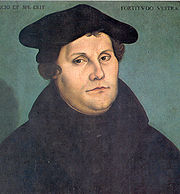
Sacramentarians
Encyclopedia

Christian
A Christian is a person who adheres to Christianity, an Abrahamic, monotheistic religion based on the life and teachings of Jesus of Nazareth as recorded in the Canonical gospels and the letters of the New Testament...
s during the Protestant Reformation
Protestant Reformation
The Protestant Reformation was a 16th-century split within Western Christianity initiated by Martin Luther, John Calvin and other early Protestants. The efforts of the self-described "reformers", who objected to the doctrines, rituals and ecclesiastical structure of the Roman Catholic Church, led...
who denied not only the Roman Catholic transubstantiation
Transubstantiation
In Roman Catholic theology, transubstantiation means the change, in the Eucharist, of the substance of wheat bread and grape wine into the substance of the Body and Blood, respectively, of Jesus, while all that is accessible to the senses remains as before.The Eastern Orthodox...
but also the Lutheran sacramental union
Sacramental Union
Sacramental union is the Lutheran theological doctrine of the Real Presence of the body and blood of Christ in the Christian Eucharist....
.
They comprised two parties:
- the followers of Capito, CarlstadtAndreas KarlstadtAndreas Rudolph Bodenstein von Karlstadt , better known as Andreas Karlstadt or Andreas Carlstadt or Karolostadt, was a German Christian theologian during the Protestant Reformation. He was born in Karlstadt, Franconia.-Education:Karlstadt received his doctorate of theology in 1510 from the...
and BucerMartin BucerMartin Bucer was a Protestant reformer based in Strasbourg who influenced Lutheran, Calvinist, and Anglican doctrines and practices. Bucer was originally a member of the Dominican Order, but after meeting and being influenced by Martin Luther in 1518 he arranged for his monastic vows to be annulled...
, who at the diet of AugsburgDiet of AugsburgThe Diet of Augsburg were the meetings of the Imperial Diet of the Holy Roman Empire in the German city of Augsburg. There were many such sessions, but the three meetings during the Reformation and the ensuing religious wars between the Roman Catholic emperor Charles V and the Protestant...
presented the Confessio Tetrapolitana from Strassburg, KonstanzKonstanzKonstanz is a university city with approximately 80,000 inhabitants located at the western end of Lake Constance in the south-west corner of Germany, bordering Switzerland. The city houses the University of Konstanz.-Location:...
, LindauLindauLindau is a Bavarian town and an island on the eastern side of Lake Constance, the Bodensee. It is the capital of the Landkreis or rural district of Lindau. The historic city of Lindau is located on an island which is connected with the mainland by bridge and railway.- History :The name Lindau was...
and MemmingenMemmingenMemmingen is a town in the Bavarian administrative region of Swabia in Germany. It is the central economic, educational and administrative centre in the Danube-Iller region. To the west the town is flanked by the Iller, the river that marks the Baden-Württemberg border... - the followers of the Swiss reformer ZwingliHuldrych ZwingliUlrich Zwingli was a leader of the Reformation in Switzerland. Born during a time of emerging Swiss patriotism and increasing criticism of the Swiss mercenary system, he attended the University of Vienna and the University of Basel, a scholarly centre of humanism...
, who to the same diet presented his private confession of faith.
The doctrinal standpoint was the same – an admission of a spiritual presence of Christ which the devout soul can receive and enjoy, but a total rejection of any physical or corporeal presence.
After holding their own view for some years the four cities accepted the Confession of Augsburg, and were merged in the general body of Lutherans; but Zwingli's position was incorporated in the Helvetic Confession. It is a curious inversion of terms that in recent years has led to the name Sacramentarians being applied to those who hold a high or extreme view of the efficacy of the sacraments.

